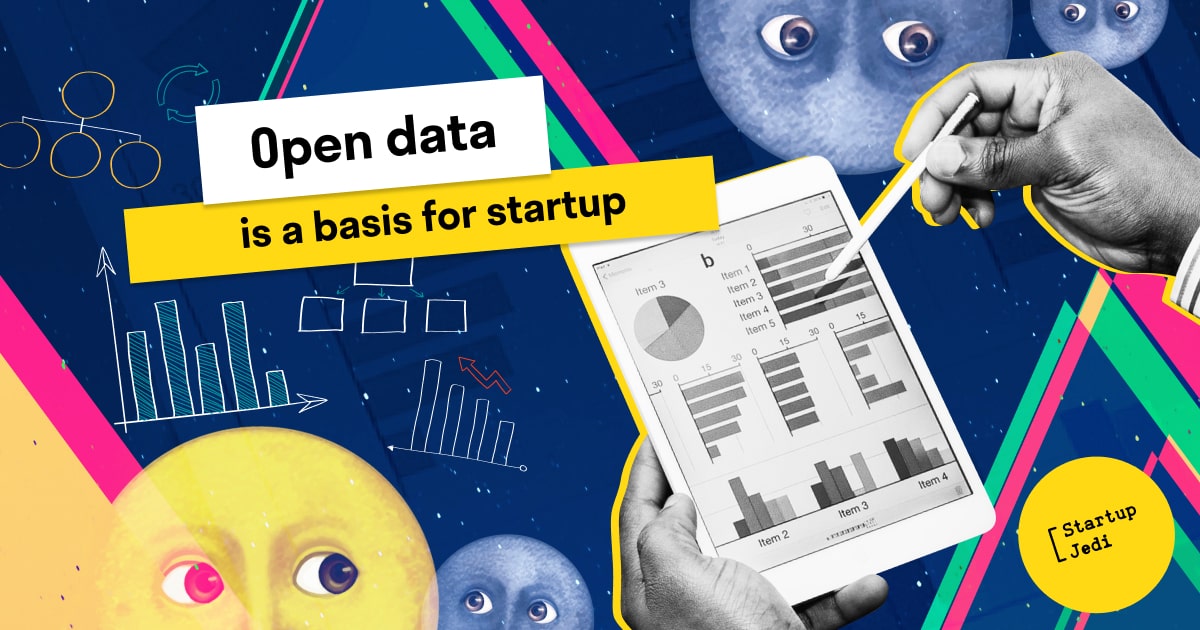
Startup Jedi
We talk to startups and investors, you get the value.

Startup Jedi
We talk to startups and investors, you get the value.
At the end of the 20th century, natural resources, in particular oil, were replaced by the digital economy, which became the "new oil". At the same time, there has started a movement to ensure that the data that is created in the digital world remains or becomes open. Today we will focus specifically on open data, as a movement and a basis for creating new startups.

If you turn to Wikipedia, you can read that “Open data is a concept that reflects the idea that certain data should be freely available for machine-readable use and further republishing without restrictions on copyright, patents and other control mechanisms."
At the same time, the concept of open data is inextricably linked with copyright and free licenses, which are combined under the general name Creative Commons. It is important to remember that if a dataset is posted on the Internet but is not in the public domain or is not bound by a license that gives the right to free reuse, then such a dataset cannot be considered open.
Worth mentioning that open data, although it is a "close relative" of other "open" movements (for example, open source software, open content or open access), but it is not identical.
The idea of open data originated in the second half of the 2000s with the launch of the Data.gov government resource, where the US government disclosed open government data. The idea of open government data has become widespread in the West: the UK launched data.gov.uk, the European Union discloses its data at data.europa.eu, and Italy became the first country to implement the Creative Commons principles and guidelines in the public administration sphere (ODMC — Open Data Management Cycle).
Another important factor that influenced the development and distribution of open data was the establishment of the Open Government Partnership initiative in New York in 2011, designed to promote the idea of open government, anti-corruption and the use of technology to strengthen citizens' control over the national and regional levels of government (in 2016, at the annual summit for enhancing transparency in government procurement, the OGP award was received by ProZorro, the Ukrainian project, which brought public procurement and tendering out of “the shadows”).
Another huge segment that generates open data is non-profit organizations that don’t try to monetize access to their own data, unlike commercial organizations. For example, OpenNWT launched a website with open data on elections in Canada. And Couchsurfing, a global hospitality service, long before it became a commercial organization in 2011, offered multiple research teams access to its social network data.

Before talking about the startups that successfully use open data to create their own products, let's talk about those who support their development.
ODINE (Open Data Incubator Europe). Although its name resembles the supreme god of the Vikings, it is a European incubator that supports the development of open data startups in Europe being supported by the Horizon 2020 grant program. In 2016-2017, it helped the formation of several projects in Europe, including Sentinel Hub, which analyzes satellite images.
The ODI (Open Data Institute) is another organisation from Great Britain that works with governmental and commercial organizations to build an open and trustworthy data ecosystem, where people will be able to find the best solutions based on the data and manage any unlikely influence.
1991 Open Data incubator is a Ukrainian incubator, which has been systematically developing projects that are somehow related to open or big data for the last five years. The partners of this incubator are the Cabinet of Ministers of Ukraine, Microsoft, Western NIS Enterprise Fund, the National Bank of Ukraine and others.

Now, when we know those who support startups that build their work based on open data, let’s talk specifically about these startups. In this article, there are only three startups from the whole world but there are hundreds of them.
Metadata Technology is an American project that is an open government data management platform. It allows users to manually or automatically analyze data to form socially significant decisions.
Politik.ch is a European startup from Switzerland that develops a platform for professional politicians. Their database contains daily updated information from all 26 cantons of Switzerland and national parliaments. The information is structured in a way that it is easier to index and analyze.
Civic Ledger is an Australian startup which is a blockchain platform for open government. It uses blockchain and smart contracts to create a secure and digital environment for the exchange of information. The exchange takes place between government and society (g2c), which enhances the citizens’ trust.

Open data in the modern world is almost a "klondike", which was the Klondike for gold diggers. At the same time, unlike gold diggers, you don’t need to travel halfway across the world in order to extract grains of gold. The new gold is available to anyone with access to the world wide web and an idea for a challenge that will help fight corruption, build a more inclusive society, and increase trust in government. And all this is part of a better world where each of us would like to live.
Facebook: facebook.com/StartupJedi/
Telegram: t.me/Startup_Jedi
Twitter: twitter.com/startup_jedi
Comments